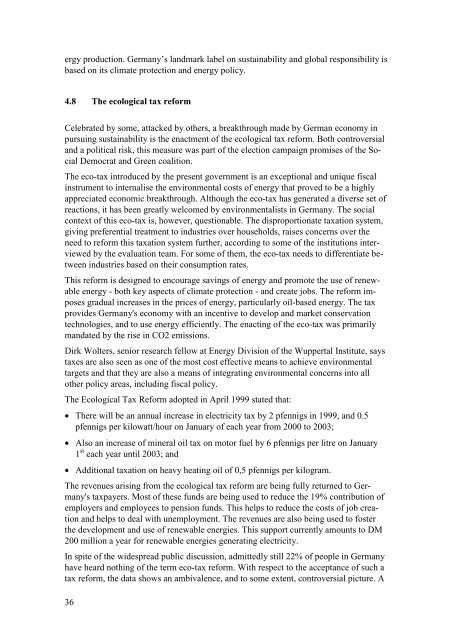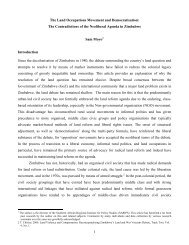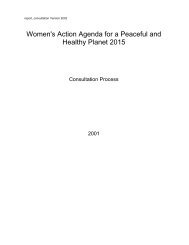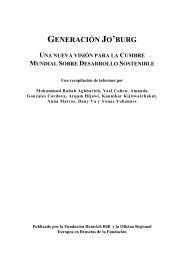Sustainable Germany: A View from the South; July 2002 -- pdf
Sustainable Germany: A View from the South; July 2002 -- pdf
Sustainable Germany: A View from the South; July 2002 -- pdf
Create successful ePaper yourself
Turn your PDF publications into a flip-book with our unique Google optimized e-Paper software.
ergy production. <strong>Germany</strong>’s landmark label on sustainability and global responsibility is<br />
based on its climate protection and energy policy.<br />
4.8 The ecological tax reform<br />
Celebrated by some, attacked by o<strong>the</strong>rs, a breakthrough made by German economy in<br />
pursuing sustainability is <strong>the</strong> enactment of <strong>the</strong> ecological tax reform. Both controversial<br />
and a political risk, this measure was part of <strong>the</strong> election campaign promises of <strong>the</strong> Social<br />
Democrat and Green coalition.<br />
The eco-tax introduced by <strong>the</strong> present government is an exceptional and unique fiscal<br />
instrument to internalise <strong>the</strong> environmental costs of energy that proved to be a highly<br />
appreciated economic breakthrough. Although <strong>the</strong> eco-tax has generated a diverse set of<br />
reactions, it has been greatly welcomed by environmentalists in <strong>Germany</strong>. The social<br />
context of this eco-tax is, however, questionable. The disproportionate taxation system,<br />
giving preferential treatment to industries over households, raises concerns over <strong>the</strong><br />
need to reform this taxation system fur<strong>the</strong>r, according to some of <strong>the</strong> institutions interviewed<br />
by <strong>the</strong> evaluation team. For some of <strong>the</strong>m, <strong>the</strong> eco-tax needs to differentiate between<br />
industries based on <strong>the</strong>ir consumption rates.<br />
This reform is designed to encourage savings of energy and promote <strong>the</strong> use of renewable<br />
energy - both key aspects of climate protection - and create jobs. The reform imposes<br />
gradual increases in <strong>the</strong> prices of energy, particularly oil-based energy. The tax<br />
provides <strong>Germany</strong>'s economy with an incentive to develop and market conservation<br />
technologies, and to use energy efficiently. The enacting of <strong>the</strong> eco-tax was primarily<br />
mandated by <strong>the</strong> rise in CO2 emissions.<br />
Dirk Wolters, senior research fellow at Energy Division of <strong>the</strong> Wuppertal Institute, says<br />
taxes are also seen as one of <strong>the</strong> most cost effective means to achieve environmental<br />
targets and that <strong>the</strong>y are also a means of integrating environmental concerns into all<br />
o<strong>the</strong>r policy areas, including fiscal policy.<br />
The Ecological Tax Reform adopted in April 1999 stated that:<br />
• There will be an annual increase in electricity tax by 2 pfennigs in 1999, and 0.5<br />
pfennigs per kilowatt/hour on January of each year <strong>from</strong> 2000 to 2003;<br />
• Also an increase of mineral oil tax on motor fuel by 6 pfennigs per litre on January<br />
1 st each year until 2003; and<br />
• Additional taxation on heavy heating oil of 0,5 pfennigs per kilogram.<br />
The revenues arising <strong>from</strong> <strong>the</strong> ecological tax reform are being fully returned to <strong>Germany</strong>'s<br />
taxpayers. Most of <strong>the</strong>se funds are being used to reduce <strong>the</strong> 19% contribution of<br />
employers and employees to pension funds. This helps to reduce <strong>the</strong> costs of job creation<br />
and helps to deal with unemployment. The revenues are also being used to foster<br />
<strong>the</strong> development and use of renewable energies. This support currently amounts to DM<br />
200 million a year for renewable energies generating electricity.<br />
In spite of <strong>the</strong> widespread public discussion, admittedly still 22% of people in <strong>Germany</strong><br />
have heard nothing of <strong>the</strong> term eco-tax reform. With respect to <strong>the</strong> acceptance of such a<br />
tax reform, <strong>the</strong> data shows an ambivalence, and to some extent, controversial picture. A<br />
36







